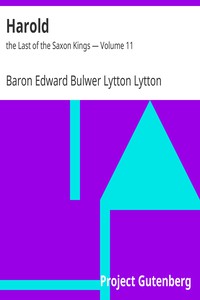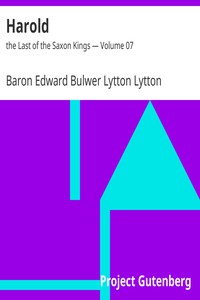Harold : the Last of the Saxon Kings — Complete by Lytton (good books for 8th graders .TXT) 📗

- Author: Lytton
Book online «Harold : the Last of the Saxon Kings — Complete by Lytton (good books for 8th graders .TXT) 📗». Author Lytton
But while these three interchanged salutations, and ere yet the mixed Mercians and Welch had gained the encampment, from a curve in the opposite road, towards Towcester and Dunstable, broke the flash of mail like a river of light, trumpets and fifes were heard in the distance; and all in Morcar’s host stood hushed but stern, gazing anxious and afar, as the coming armament swept on. And from the midst were seen the Martlets and Cross of England’s king, and the Tiger heads of Harold; banners which, seen together, had planted victory on every tower, on every field, towards which they had rushed on the winds.
Retiring, then, to the central mound, the chiefs of the insurgent force held their brief council.
The two young Earls, whatever their ancestral renown, being yet new themselves to fame and to power, were submissive to the Anglo-Dane chiefs, by whom Morcar had been elected. And these, on recognising the standard of Harold, were unanimous in advice to send a peaceful deputation, setting forth their wrongs under Tostig, and the justice of their cause. “For the Earl,” said Gamel Beorn (the head and front of that revolution,) is a just man, and one who would shed his own blood rather than that of any other freeborn dweller in England; and he will do us right.”
“What, against his own brother?” cried Edwin.
“Against his own brother, if we convince but his reason,” returned the Anglo-Dane.
And the other chiefs nodded assent. Caradoc’s fierce eyes flashed fire; but he played with his torque, and spoke not.
Meanwhile, the vanguard of the King’s force had defiled under the very walls of Northampton, between the town and the insurgents; and some of the light-armed scouts who went forth from Morcar’s camp to gaze on the procession, with that singular fearlessness which characterised, at that period, the rival parties in civil war, returned to say that they had seen Harold himself in the foremost line, and that he was not in mail.
This circumstance the insurgent thegns received as a good omen; and, having already agreed on the deputation, about a score of the principal thegns of the north went sedately towards the hostile lines.
By the side of Harold,—armed in mail, with his face concealed by the strange Sicilian nose-piece used then by most of the Northern nations,—had ridden Tostig, who had joined the Earl on his march, with a scanty band of some fifty or sixty of his Danish house-carles. All the men throughout broad England that he could command or bribe to his cause, were those fifty or sixty hireling Danes. And it seemed that already there was dispute between the brothers, for Harold’s face was flushed, and his voice stern, as he said, “Rate me as thou wilt, brother, but I cannot advance at once to the destruction of my fellow Englishmen without summons and attempt at treaty,—as has ever been the custom of our ancient heroes and our own House.”
“By all the fiends of the North?” exclaimed Tostig, “it is foul shame to talk of treaty and summons to robbers and rebels. For what art thou here but for chastisement and revenge?”
“For justice and right, Tostig.”
“Ha! thou comest not, then, to aid thy brother?”
“Yes, if justice and right are, as I trust, with him.”
Before Tostig could reply, a line was suddenly cleared through the armed men, and, with bare heads, and a monk lifting the rood on high, amidst the procession advanced the Northumbrian Danes.
“By the red sword of St. Olave!” cried Tostig, “yonder come the traitors, Gamel Beorn and Gloneion! You will not hear them? If so, I will not stay to listen. I have but my axe for my answer to such knaves.”
“Brother, brother, those men are the most valiant and famous chiefs in thine earldom. Go, Tostig, thou art not now in the mood to hear reason. Retire into the city; summon its gates to open to the King’s flag. I will hear the men.”
“Beware how thou judge, save in thy brother’s favour!” growled the fierce warrior; and, tossing his arm on high with a contemptuous gesture, he spurred away towards the gates.
Then Harold, dismounting, stood on the ground, under the standard of his King, and round him came several of the Saxon chiefs, who had kept aloof during the conference with Tostig.
The Northumbrians approached, and saluted the Earl with grave courtesy.
Then Gamel Beorn began. But much as Harold had feared and foreboded as to the causes of complaint which Tostig had given to the Northumbrians, all fear, all foreboding, fell short of the horrors now deliberately unfolded; not only extortion of tribute the most rapacious and illegal, but murder the fiercest and most foul. Thegns of high birth, without offence or suspicion, but who had either excited Tostig’s jealousy, or resisted his exactions, had been snared under peaceful pretexts into his castle 213, and butchered in cold blood by his house-carles. The cruelties of the old heathen Danes seemed revived in the bloody and barbarous tale.
“And now,” said the thegn, in conclusion, “canst thou condemn us that we rose?—no partial rising;—rose all Northumbria! At first but two hundred thegns; strong in our course, we swelled into the might of a people. Our wrongs found sympathy beyond our province, for liberty spreads over human hearts as fire over a heath. Wherever we march, friends gather round us. Thou warrest not on a handful of rebels,—half England is with us!”
“And ye,—thegns,” answered Harold, “ye have ceased to war against Tostig, your Earl. Ye war now against the King and the Law. Come with your complaints to your Prince and your Witan, and, if they are just, ye are stronger than in yonder palisades and streets of steel.”
“And so,” said Gamel Beorn, with marked emphasis, “now thou art in England, O noble Earl,—so are we willing to come. But when thou wert absent from the land, justice seemed to abandon it to force and the battle-axe.”
“I would thank you for your trust,” answered Harold, deeply moved. “But justice in England rests not on the presence and life of a single man. And your speech I must not accept as a grace, for it wrongs both my King and his Council. These charges ye have made, but ye have not proved them. Armed men are not proofs; and granting that hot blood and mortal infirmity of judgment have caused Tostig to err against you and the right, think still of his qualities to reign over men whose lands, and whose rivers, lie ever exposed to the dread Northern sea-kings. Where will ye find a chief with arm as strong, and heart as dauntless? By his mother’s side he is allied to your own lineage. And for the rest, if ye receive him back to his earldom, not only do I, Harold in whom you profess to trust, pledge full oblivion of the past, but I will undertake, in his name, that he shall rule you well for the future, according to the laws of King Canute.”
“That will we not hear,” cried the thegns, with one voice; while the tones of Gamel Beorn, rough with the rattling Danish burr, rose above all, “for we were born free. A proud





Comments (0)